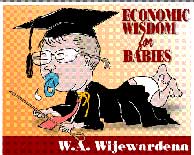
Marriage: Economic principles of work allocation
When I made a neighbourly visit to this newly-wed young couple, I overheard an argument between the husband and the wife. “You must cook today,” wife tells husband. “No, it’s your duty to cook. You should do it,” husband argues back. I felt my presence would embarrass them and, so, I stood at the door for sometime debating whether to walk in or not. But, then, before I could make a decision, the wife saw me at the door and, in the next moment, I was walking into their sitting room.
Even before I was seated, they came out with each one’s complaint against the other. It also appeared that each one of them expected me to take his or her side and impose my adjudication on the other person. “Look, children,” I said. “You should look at economics to decide who should do what. There’s no purpose of going on arguing with each other.” “How could economics help us to decide what we should do?” both chorused in unison. “Economics is concerned with efficient allocation of resources in an economy. The same principles of efficiency can be applied to a household as well,” I said.They temporarily set aside their disagreement and settled to listen to me. “In terms of economics,” I began my explanation, “a marriage is a production unit that produces a great deal of goods and services in-house or buys the same from the market for the welfare of the unit. So, its objective is to have the highest level of welfare. Economists call this maximization of welfare.” They didn’t interrupt, so I continued. “Like any other production unit, it also uses factors of production to produce its output. If these factors are not efficiently allocated, then, the level of welfare the family could attain becomes less than the best or as economists say, sub-optimal.”“What’re those factors?” the husband inquired. “You make up one of the factors called labour,” I replied. “The other factors are the money you use, called capital, house and other associated equipment you use, called land and the way you organize everything called enterprise. All these factors should be combined to produce those goods and services that contribute to your welfare. If you make a mistake when combining these factors, your welfare or happiness would be less.” “Economics shouldn’t decide against women,” the wife put a condition to our analysis. “It shouldn’t do it against men either,” the husband, said expressing his view. “Alright, alright,” I responded. “No need for fighting again. Economics is neutral on both men and women. It doesn’t take sides. It simply lays down principles and if you wish to have the highest happiness, you could follow them.” They calmed down again and looked at me attentively. So, I continued my discourse. “Economics says that what each one of us should do in the family, like in a factory, should be based on our own relative strength. Economists call this comparative advantage. If one person is better than the other in doing something, that person should do that thing. For example, if the wife is better in marketing, she should do it. If the less capable husband does it, then, the family makes a loss in marketing and it reduces the happiness of all.” “That’s interesting. I’m good at marketing. So, let me do it,” the husband beamed with delight. “Wait a minute. It’s not that easy,” I said. “What economics says is not to go by good. It should be based on better. So, the person who is better should do it. These factors are used to the best advantage of the family.” “I now understand,” the wife said. “Before we marry, we have to make an assessment of who is better at doing what and reconcile it. Then, we don’t have to argue with each other and cause unhappiness to both.” “That’s precisely the point,” I explained. “If the husband’s better at cooking, he should do the cooking and the wife’s better at marketing, she should do the marketing. It shouldn’t be based on a pre-determined set of allocations or on a socially agreed system of allocation. If the work’s allocated according to the relative strength of each party, then, the production is faster and better. Its result is for the whole production to become efficient allowing all of us to have more free time for leisure. It’s leisure and not working that gives us happiness.” “That means both of us have to start from the drawing-boards once again,” the wife lamented. “Yes, except on one job,” I said, qualifying her statement. “What’s it?” the husband asked. “Biology has already determined that holding a baby in the womb is a woman’s job. She’s the most suited to do that job. There, it’s already pre-determined and you’ve no choice.” |
|
||||||
|
||||||
| || Front
Page | News
| Editorial
| Columns
| Sports
| Plus
| Financial
Times | International
| Mirror
| TV
Times | Funday Times || |
| |
Reproduction of articles permitted when used without any alterations to contents and the source. |
© Copyright
2008 | Wijeya
Newspapers Ltd.Colombo. Sri Lanka. All Rights Reserved. |

